Most remember Tom Jonas as the stoic Port Adelaide captain. But, as he tells MATT TURNER, he cried more times last year than in his entire life. In an emotional and powerful interview, he reveals the struggle he hid from almost everyone.
Heavy metal drumming blares through the speakers of Tom Jonas’s Toyota Prado.
The Port Adelaide captain is behind the wheel, driving along the southeastern freeway with tears rolling down his cheeks.
It is late one morning, near the halfway point of the AFL season.
Jonas has skipped a Power weights session to head to the small town of Younghusband on the Murray River.
Weighed down by his struggles to break into the team and the awkwardness of being an AFL captain playing in the SANFL, the father-of-two needs to be by himself.
In his own world with only his thoughts, on a three-hour round trip to his family’s shack.
Well, his thoughts, plus the brutal sounds and agitated lyrics of what he is playing on Spotify.
“I’m not the biggest heavy metal fan, but it found a place that day,” Jonas tells this masthead.
“I started with something soft rocky like Blink-182 and then ended up with Slipknot or something.
“It was a little bit therapeutic – you let it all out and then feel a little bit better.”
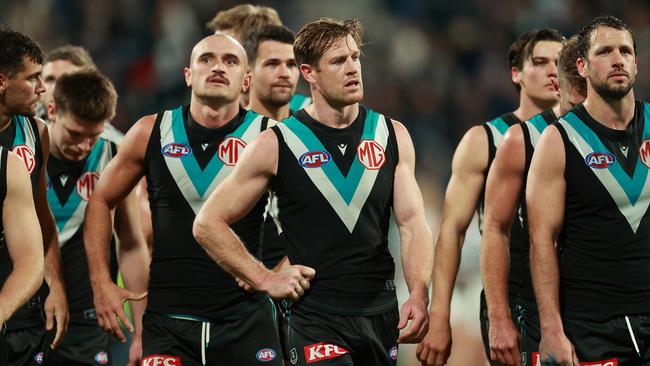
Slipknot seems an apt music choice for Jonas’s drive.
The American nu-metal group is renowned for performing in masks – in their case homemade, Halloween face coverings.
Jonas wore a figurative mask often during the 2023 season.
He put it on at Alberton and Adelaide Oval, whenever he was with the Power or in his role as skipper.
It helped him hide what he was really feeling.
Reality was Jonas was so frustrated at how his year unfolded that he had to be talked out of retiring mid-season.
In his mind, he was letting himself down and not meeting his personal expectations.
Coming to terms with his football mortality was painful.
“I cried more in the last 12 months than I have for the entirety of my life,” the 33-year-old says candidly.
“It was almost like an identity crisis that’s pretty common with people’s identity being closely tied with them as a footballer and how they perform.”
The writing on the wall for Jonas’s career appeared quickly.
Port reappointed him as captain in February last season.
Come round 9, coach Ken Hinkley was telling him he would probably be out of favour at selection for the remainder of the year.
Jonas treated that game – against North Melbourne in Hobart – as though it might be his last.
“I had a club videographer following us around, taking photos, and the whole family was flown down last minute,” he says.
“I don’t think anyone else knew, it was kind of under the radar.
“It was just a possibility that was going to be the last game.
“I kicked a goal, had an all-right game and we won, and I got picked the next week.”
The reprieve was short-lived.
Jonas received a one-match suspension for a dangerous tackle on Melbourne’s Tom McDonald the following game.
Then he could not break back into the team as the Power picked two, rather than three, key defenders and younger options.
“Last year was probably a combination of me slowing down, not playing quite as good footy, and the dynamic of the team changing,” he says.
“Sometimes it’s in the eye of the beholder of what you’re dishing up and it’s hard to know whether perception’s shift of what you bring to the side or whether you’re just not performing.
“I’m never going to be able to look at that from a completely unbiased point of view.
“I didn’t feel like I was playing as bad as what it sometimes feels like you’re playing.
“But in terms of growth potential, at 32, I probably wasn’t going to improve exponentially, whereas someone like Lachie Jones, who has a lot of weapons and has played a lot of good footy, has a lot of upside.”
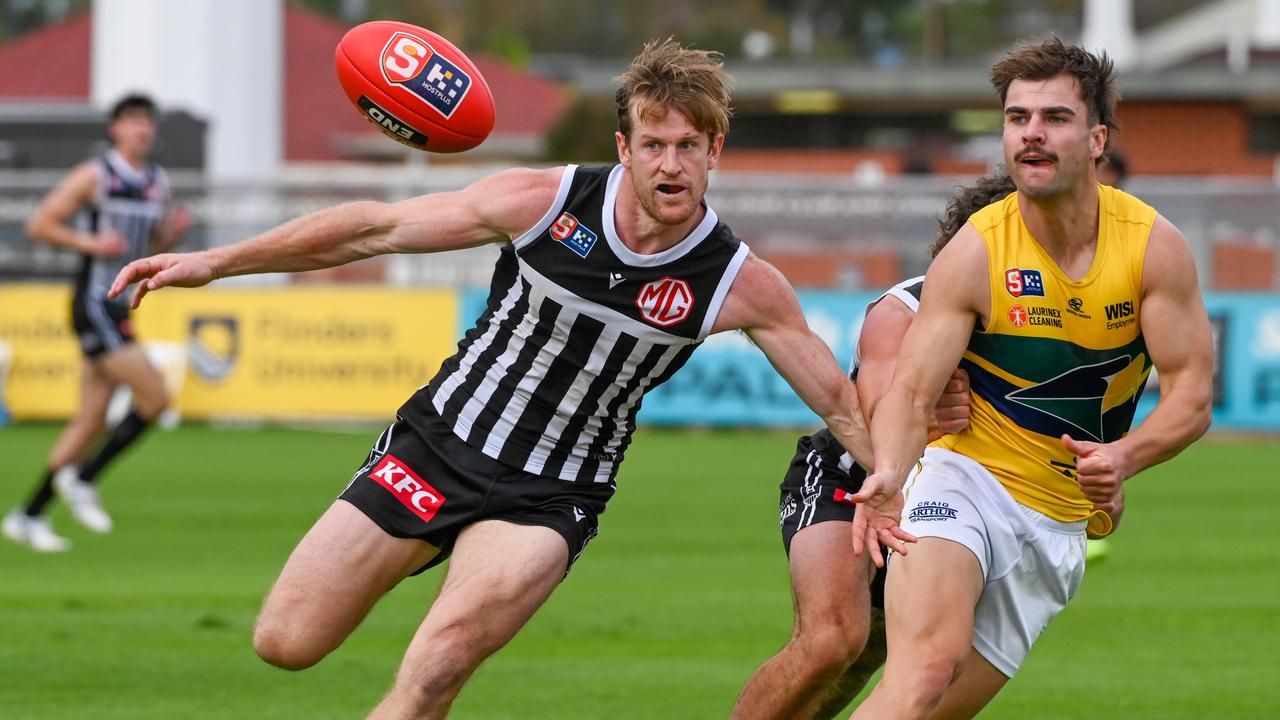
What started as one match as an emergency turned into five more weeks out of the side.
During that time, the Power extended its winning streak to a club record 13 games.
And Jonas began grappling with the idea of pulling the pin mid-year.
Turning up to the club became too hard.
He was too unhappy.
Wearing his mask was exhausting.
“You’re having to roll in every day and pretend everything was rosy, and invest in others when you’re just trying to keep yourself afloat,” he says.
“I’m essentially that figurehead of the playing group (as captain) so to not be playing or not playing as well as you’d like to … that’s tough.
“You always want to lead on field and you’re also trying to be the best leader and person to others around the club.
“I’d put my mask on when I went into the club – essentially fake it until you make it.
“When I’m there, I’d be the best leader I could be and give everything I could.
“Then I would walk out of the club, get into the car and have a big exhale, and release.”
Jonas built his reputation across 13 seasons and 216 games at Port Adelaide as a tough-as-nails, no-frills, straight-shooting leader.
His media interviews were typically bullshit-free and stoic with a sprinkling of dry humour.
So the image of him sobbing regularly after training last year is a little jarring.
“It’s probably a question for someone else to answer, but I’d like to think I’m more emotional than people probably realise,” he says.
“I just keep it to a smaller circle.”
Jonas confided about his battle to a select group of people close to him.
He estimates “maybe half a dozen” teammates were aware of what he was going through.
“There might have been some value in me letting the walls down a little bit more,” he says.
“There’s a lot of strength in vulnerability these days and I use that approach with some of my closer mates, but probably not the entire group.
“Boaky (former Power skipper Travis Boak) and I leant on each other last year because he wasn’t having the best year.
“We had some pretty raw discussions and were there for each other.
“There’s a few other boys I’m close to inside the four walls that I let in – Hamish (Hartlett), Darcy (Byrne-Jones) – then a couple of closer mates outside the club.
“Everyone’s advice was ‘we’re obviously here when we need a chat’, but particularly those external to the footy club were saying ‘hang tough’.
“Part of me was saying ‘f*** it, just throw it in’, but I was also potentially just one injury away from playing in a grand final side if we progressed to that point of the year and someone fell over.”
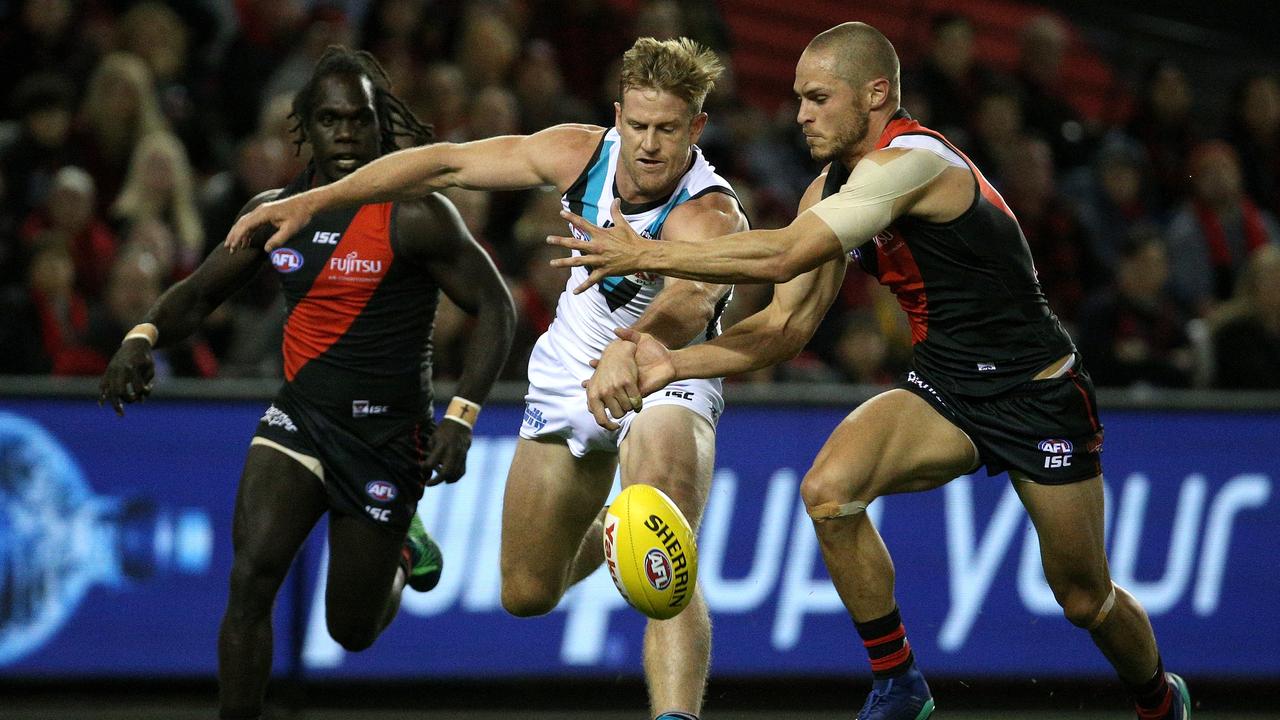
Jonas used to rib Boak for taking a lot of “sick” days as skipper.
When Jonas took over the role – first in 2019 as co-captain with Ollie Wines, then solo from 2020 – he realised they were largely mental health days.
“You sometimes just need a day for yourself, an escape from it all and hit reset,” he says.
“There was a little bit of that where I would train, do my weights, then nick off, or train and nick off.
“I’d just drive up to the river or pick the kids up – I was never short of things to do.
“Then you get home and can be myself.”
Jonas’s children, Matilda, three, and George, two, would lift his mood.
“Kids give you a natural energy – they sap it as well – but they don’t know what’s going on,” he says.
“They aren’t judging you, they’re just happy to have you around and want you to have a kick of the footy with them or read them a book.”
But Jonas concedes he “probably wasn’t that much fun to be around at home sometimes because I was flat and drained”.
“When you’re going well, it’s really easy to be up and about, and it doesn’t take as much emotional energy,” he says.
“When you’ve got to fake it, it takes a lot more of a toll.
“I usually sleep like a log but there were a lot of sleepless nights, where I’d wake up at 1am … and wouldn’t get back to sleep.
“I’d just be thinking about ‘is it all over? Should I retire? What am I going to do next?’
“It takes you down a wormhole.”
Jonas says his wife, Millie, had a great balance of empathy and forthrightness whenever he felt sorry for himself.
“She didn’t always feed into my own narrative, she’d pull me out of it from time to time, which was probably really important,” he says.
“When I was like ‘f*** it, I’m just going to retire’, she’d say ‘Tom, don’t be like that’.
“Or if I came home in a shit mood, sometimes she’d let me stew in it and sometimes she’d tell me to pull my finger out for the kids or her.”
It was Millie and Jonas’s parents who convinced him not to hang up the boots mid-season.
“They kept saying ‘it’ll be worth it’,” he recalls.
“The sort of character you are, it’s not you to bow out halfway through.”
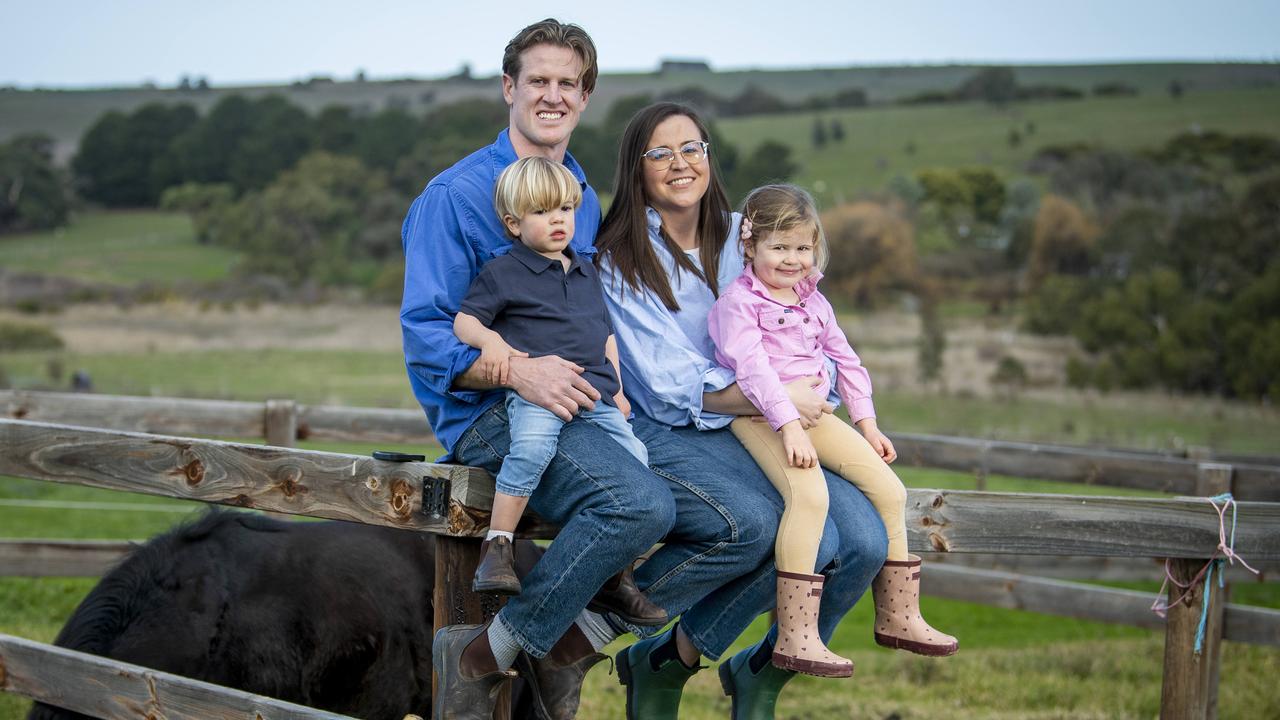
Jonas had made it to the AFL despite never being a state junior footballer, not lighting the world on fire for Rostrevor College and initially getting overlooked for Norwood’s under-18s.
He missed out on being drafted as an 18-year-old, then improved over the next 12 months and was rookie-listed by the Power.
His AFL debut came during Port Adelaide’s worst season – a three-win 2011 campaign – in its club record 165-point loss to Hawthorn at the MCG.
He played in only two victories across his first two years on the list during the Power’s darkest period.
Jonas scrapped to become an AFL regular.
He desperately threw himself at balls that came his way in the backline.
He overcame his inconspicuous start to work his way into the leadership group after just 34 games.
He became a somewhat unlikely co-captain in 2019.
He was a fighter, not a quitter.
“I’m glad I did stick around,” he says.
“It was a pretty horrible year mentally, but I feel like hopefully I’ve come out better for it, having learnt some life lessons.”
Jonas was recalled to the AFL team for round 18, only to be dropped after one game.
He would play four more times at the top level from rounds 21 to 24.
“With about eight rounds to go, I knew I was going to pull the pin, I just had to wait for the appropriate time to do it,” Jonas says.
“There was then that sweet spot two weeks out from finals where it wouldn’t distract from the finals campaign, so we marked that day in the calendar.
“Once I’d come to terms with it, it was actually a bit of a release.”
The dream of ending his career Shane Crawford-style with a premiership ended when he damaged a calf muscle during a mundane marking drill at training two days before the Power’s qualifying final against Brisbane.
“It was a bit ‘f*** me, it’s all over. How can this happen after everything that’s happened this year?’
“But it was almost ‘of course, it’s happened’.”
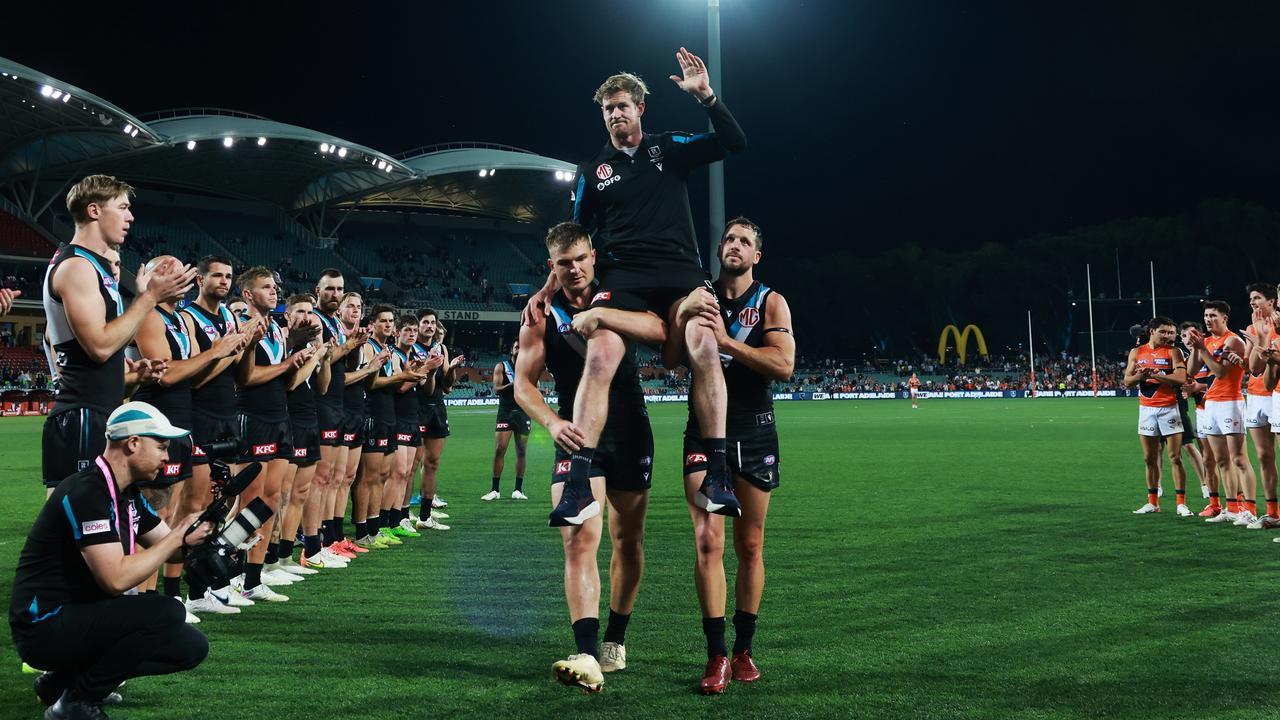
Jonas takes a sip from his piccolo coffee in a North Adelaide cafe before he begins to talk about his post-footy life.
Nearly 12 months on from his retirement last August, he appears relaxed yet excited about how busy he is off the field.
Jonas is working one day a week as a leadership consultant with the South Australian Cricket Association.
He is launching a high performance consultancy business with former Australian netball captain Nat von Bertouch called Bloom Leadership.
More energy is going into his wine label, Hey Diddle, for which he is doing some sales, marketing and picking and packing.
His life experiences have been enriched as a member of the Sony Foundation’s fundraising committee, helping young Australians with cancer through Adelaide’s first 4Ward event in October, and by walking the Kokoda Track in April as a representative for children’s not-for-profit Little Heroes Foundation.
“Kokoda gave me a bit of purpose and direction … because leading into Christmas, I had a few things in the pipeline but didn’t have anything happening,” he says.
“I was floating with the breeze a bit and not particularly enjoying it.”
Jonas also remains at Alberton.
As his on-field career was coming to an end last year, he approached Power chief executive Matthew Richardson about assisting the squad to transition into life after footy.
Jonas has helped to create the program Beyond the Bounce, which connects Port players with networking or work opportunities through club sponsors.
“It’s trying to develop our players from a professional point of view, whether that’s acquiring a skill-set, working out something they’re not interested in is half the battle – and that’s the exact same process I’m going through this year – and hopefully give them some guidance on what they can do when they finish,” he says.
“It’s a little bit self-indulgent to not go cold turkey and cut the cord, but I’ve invested my last 13 years in the club and the group, and wanted to stay around … in an area that I thought was beneficial to the club and the players.”
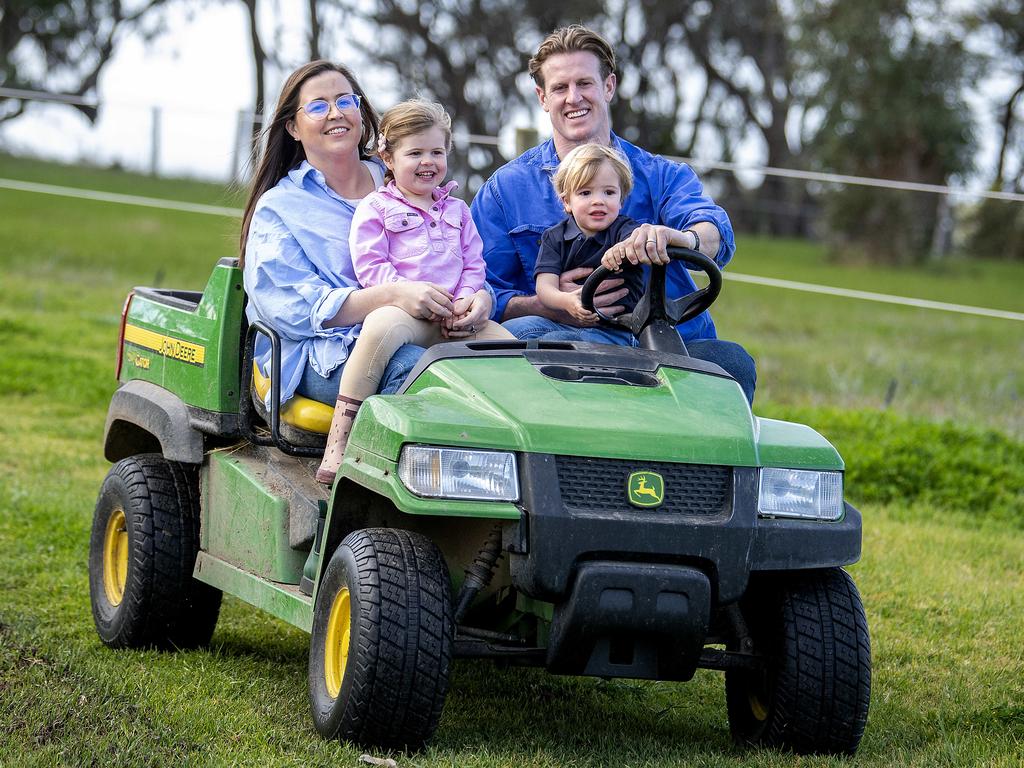
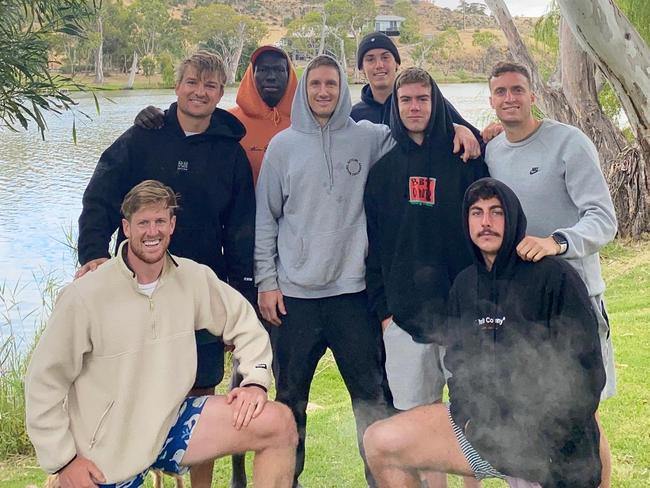
Jonas, whose role is as a stakeholder engagement specialist, works at the club twice a week – without any of his previous stresses following him.
“After last year, I’ve just enjoyed the mental release so much,” he says.
“You ride the wins and losses, but obviously not to the extent I did when I was a player.
“That performance anxiety can go from a couple of days pre-game to a couple of days post-game and, when you’re not going as well, potentially a little bit longer.
“I’m not missing that at all.”
After the rollercoaster of 2023, Jonas has maintained a good relationship with Hinkley and Port Adelaide football boss Chris Davies.
“It wasn’t a personal decision, it’s a business,” he says of falling out of the side.
“It’s the same reason someone gets traded, dropped or moved on as coach.
“If it wasn’t, blokes would play until they’re 45 or 50 because it’s the best job in the world.
“So they were making a calculated decision having taken into account all of the factors.”
Jonas is driving down the highway in the middle of winter again with music on.
This time, the tunes playing are far different – there is some Taylor Swift, Zach Bryan, Cat Stevens.
Millie, Matilda and George are with him.
They are on their way to Millie’s parents’ hobby farm, just outside the SA coastal town of Middleton.
These are the types of escapes Jonas loves most.
“I’m really just a fake farmer,” he says from a deck chair on the 20-acre property’s lawn, as his Australian shepherd, Howard, slinks past, eyeing the next ball to be thrown.
“I stick my RB Sellars (shirt) on and just come down here to get away.
“The kids ride the horses and jump on the Gator and cruise around, and we can duck into Middleton for a swim because it’s five minutes away.”
Jonas’s LinkedIn profile reads: “former captain of Port Adelaide Football Club who’s working out what next looks like”.
With the next chapter of his life ahead and his playing days in the rearview mirror, Jonas reflects with gratitude.
“I understood I wasn’t a God-given talent and could get by on that, I was a little bit reliant on the physical aspects of the game and the evolution of the team,” he says.
“I don’t feel like I had a shorter career than I might have had.
“If I go back to the start, I had a far more significant career than I would’ve thought was possible.”

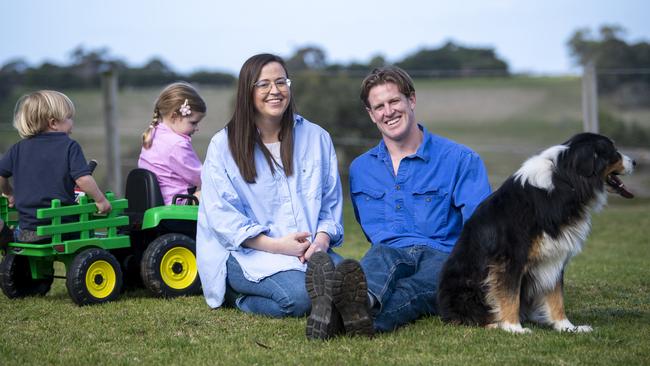
Add your comment to this story
To join the conversation, please log in. Don't have an account? Register
Join the conversation, you are commenting as Logout
The young guns who enhanced draft standing in U18 title win
A top-five draft prospect has claimed South Australia’s MVP award as the state made for a 4-0 campaign in the under-18 national championships, and a Victorian team took another hit.
Robert Walls Medal to honour AFL icon
There’s a fresh medallion in the footy world that will pay tribute to a great of the game, Robert Walls. Jay Clark has the details here.